by Alex Dueben
In his new book Megg and Mogg in Amsterdam, Simon Hanselmann continues to explore the lives of Megg, Mogg, Owl and Werewolf Jones. He started their journey in the 2014 book Megahex, which is a regular feature in Vice. Hanselmann explained that he sees this new book as a companion book to Megahex, taking place in the same time frame and exploring the characters in similar ways. The stoner humor and the wild antics are what made so many people first take notice of the comics, and Hanselmann is a funny writer and cartoonist, but what’s made the comic so interesting for so long is how the comic is so much more than that. The way that Hanselmann has treated Megg’s depression and the way that getting older has changed the characters are parts of what make the comic work., Hanselmann makes clear he’s interested in exploring more emotional fraught terrain, though wonders what that will mean for the comic.
Since the success of Megahex, Hanselmann got married and moved from Australia to the United States. Recently, he opened up about his work, where he wants to go next, why that scares him, and what’s changed.
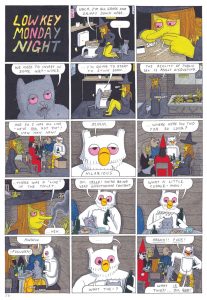
Simon Hanselmann: The Amsterdam book is all the strips I did through Vice in 2014-15, plus stuff from places like the Pitchfork Review and The Lifted Brow, stuff from self published zines, out of print micropress stuff, stuff cut from Megahex. plus a bunch of new stuff just for the book. All of it somehow elegantly jigsaws itself into a workable–albeit stoned–narrative.
Dueben: After the success of Megahex, for this book were you thinking, “I have to do this in the same way, I need to try something differently?”
Hanselmann: I don’t really think things through at all, things just happen, everything comes together slowly. Amsterdam was initially conceived as an “odds and ends” collection, a little “expansion campaign” for Megahex. In the end, after collating it all and finding an order for the stories and bridging things, it blew out into something much larger and I think it kind of stands on it’s own. I almost see it as like an alternate reality version of Megahex.
Some people have gone in thinking it’s a sequel to Megahex, and been upset over a perceived lack of continuity. It’s not the sequel to Megahex. It’s a “sister book,” a companion. It’s set “during” Megahex. It goes deeper into Megg and Mogg’s relationship. It goes deeper into Werewolf Jones. Everybody is really high and depressed and doing funny, horrible things. You should buy it if you haven’t already. It’s good for the toilet. Better than most of the other toilet books on the market. This is a classy toilet book, a “Paris Review toilet book.”
Dueben: Like your earlier book, this is a collection of short comics and you have used different media to make the comics. What’s behind you changing up material and how do people respond to that?
Hanselmann: People seem to notice that more than I would have thought. There’s a couple of colored pencil pieces in there and a few other oddities, an old strip from 2010 that just looks weird from age. I don’t know, sometimes I’ll do something a little different. I did worry that perhaps those scrappier pencil pieces might be jarring for the flow of the book but i just went with it. To hell with everything and everybody.”
Dueben: You vary the design of your pages but you always work in a grid. What do you like about working that way? What do you think that enables you to do?
Hanselmann: I’m just all about pacing. I want the reader to be able to process the information as fast as possible for a smooth read. This is also why I work in color, I think the color codifies everything and makes it easier for the brain to decipher. I’ve thought about experimenting with “crazy” layouts but I just don’t see the point. It wouldn’t serve the work.
Dueben: Some of the best comics in Megahex dealt with Megg’s depression. You continue to have her deal with that in this book – and give her the world’s worst therapist.
Hanselmann: There’s a lot of “wacky” Owl and Werewolf Jones bullshit in this one, but there’s still a bunch of horrible depression stuff too. Hooray! I’ve seen people saying it’s darker than Megahex. I guess Werewolf Jones’s parenting could be described as “intense child abuse.” But yeah, I’ve had some bad therapists over the last twenty years–that’s just my therapist in the book.
Dueben: You mentioned the last time we spoke that you had years of stories in mind and that you saw this as a long term project. Is that still your plan or has your approach changed?
Hanselmann: Oh yeah, that’s the plan. I’m Love and Rockets-ing this shit. I have piles and piles of outlines for future episodes. It takes so long to paint all these pages. I’m very far ahead in terms of mapping and planning. All other plans for comics that aren’t Megg and Mogg based have gone out the window. I just want to draw Megg and Mogg. I love them. Forever and always.
Dueben: You close out the book with a long story where Megg and Mogg go to Amsterdam–which people might have guessed from the book’s title. Where did this story came from?
Hanselmann: It’s based partially on a trip I took to Amsterdam in 2010 or so. It wasn’t a very good trip. A childhood friend of mine’s parent’s indeed had a “fuck zone” installed for a while. There’s a bunch of random stuff in there. I find it difficult to process that piece as a whole. I serialized it in one or two page chunks on Vice. It was my first experiment with serialization and I found it very stressful. Making weekly, self-contained short-burst chapters–under duress–that will all gracefully coalesce into a solid narrative is very difficult. I quit Vice due to exhaustion and finished the last ten pages of it in one go, for the book, almost a year after I’d last touched it. I was concerned it was a failure but people have said nice things. I will not be attempting any such serialization again anytime soon. I need to breathe. I find it so hard to write those tight little one or two pagers. All the stories I want to draw are generally 6-10 (or 100+) pages in length. Ugh. Kill me.
Dueben: The characters are getting older and the tone is darker than the last book–though some of that is just getting older. Turning 30 makes everything seems a little bleaker.
Hanselmann: I almost had a nervous breakdown over turning 30. I’m 34 now and it’s actually pretty good. I’m happier than I’ve ever been in my life. I know exactly what I want. It does suck that my body is really starting to fall apart now and I’m getting much, much closer to some kind of horrible death… Sigh. I’m so spoiled. I’m happy. I don’t want to die.
Dueben: At the end of Megahex, you said that the story would be continued in Megg’s Coven. And this book it’s mentioned that forthcoming will be the books Bad Gateway and Megg’s Coven. What can we look forward to next with these characters?
Hanselmann: I’m slowly working up to Megg’s Coven. I’m hoping to start proper work on it early next year and am figuring it out. That book’s going to be quite intense for me. It’s all about my mother and long term drug abuse and it’ll be a lot heavier than Megg and Mogg is currently. I’m finishing off all the scripts I have for the current iteration of Megg and Mogg, then I’ll start to move the timeline along.
Bad Gateway is a book I planned to do with Breakdown Press this year, but some things got in the way. (the death of two friends, finances). I still plan to get Bad Gateway done at some point soon. It’s set during Megg’s college years when she’s still living with her mother. It’s kind of related to Megg’s Coven.
The next major book though will be a third hardback in the style of Amsterdam and Megahex. It’ll collect a bunch of current loose and out of print stuff and a bunch of new stuff i’m working on for it. I’ll probably make more mini comics this year and see how long I can last with my current stint on Vice.
Dueben: Now as far as the timelines, Megahex and Amsterdam–and the next book–are taking place in roughly the same time, this span of a couple years. But you do have a lot of ideas for the past and the future of these characters, some of which we’ve seen on tumblr, like the death of Werewolf Jones.
Hanselmann: Yeah, I’m very far ahead with the plotting and shit. I want to start to move it along soon, but I have to figure out a way to do it. I’d like to disappear for four years and then just drop Megg’s Coven but I need to make money in the meantime. Maybe I can figure out a way to make Megg’s Coven work for serialization on Vice? Maybe I’ll do a fucking patreon or something?
Dueben: As part of that, I said before how well I think you handle Megg’s depression, how you manage to make this not just be drug humor or crazy hijinks, but is part of you worrying about trying to do something darker, more complicated, with a very different tone? Does that require a different approach for you?
Hanselmann: I do worry about potentially ruining Megg, Mogg, and Owl by completely changing it up–and killing off a character–but I guess I can always jump around in time and do whatever I want. I keep writing more and more “everybody picks on Owl” and “Werewolf Jones is a terrible father” stories, but at some point I have to put those on the back burner and continue the thread of Owl moving out and what happens after that.
I drew four pages of it in 2012 or so and it was actually quite difficult, it was some very difficult material for me. I think I cried on one of the read throughs. Perhaps I am putting off Megg’s Coven due to the personal, traumatic nature of the material? It’ll be cathartic in a way but also quite draining I imagine.
Dueben: Some people I’m sure know that in recent years you got married to an amazing woman and you moved from Australia to the United States. Do you think living here in the states has changed your work?
Hanselmann: Nah. I barely leave the house.
Megg and Mogg in Amsterdam is out now.


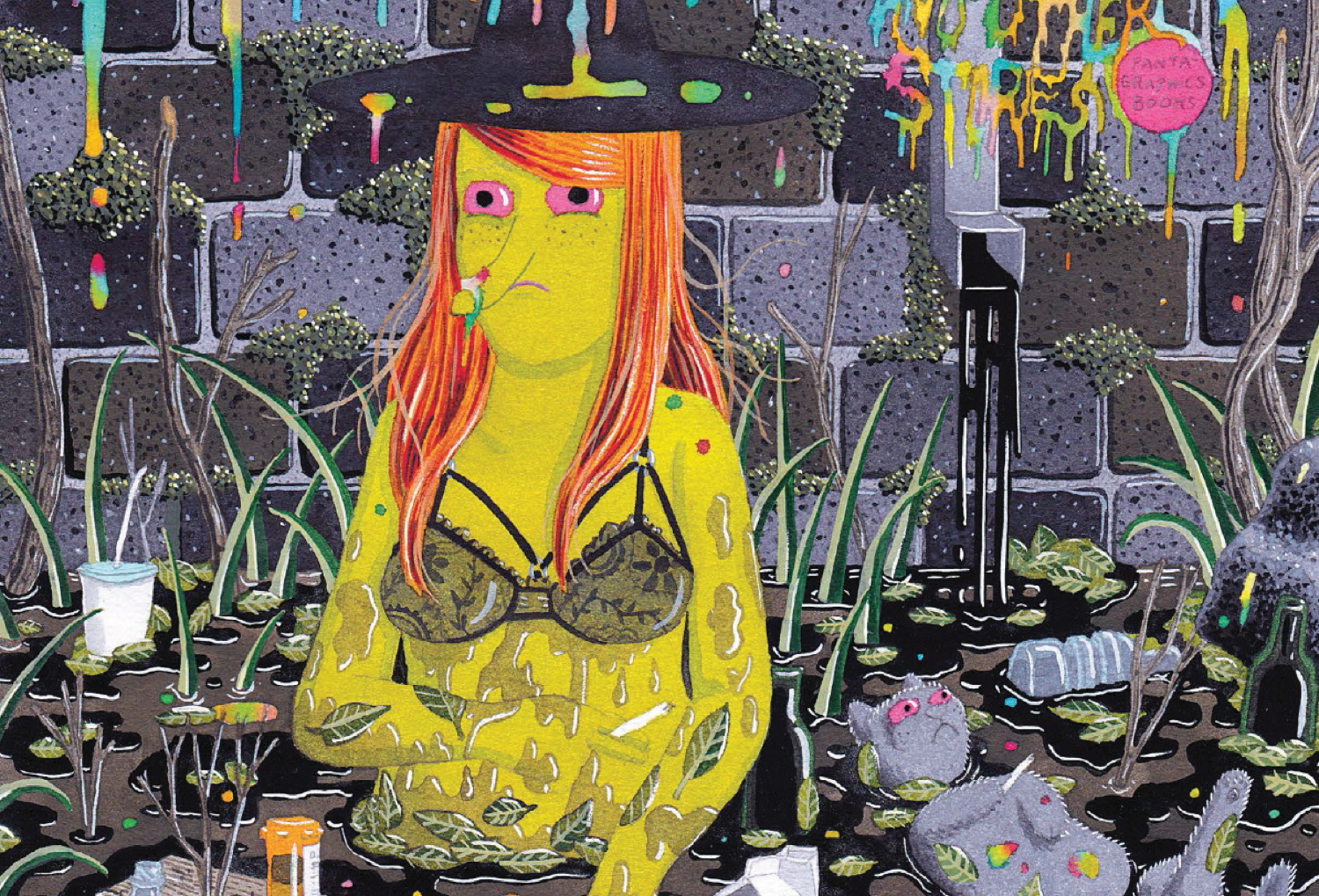
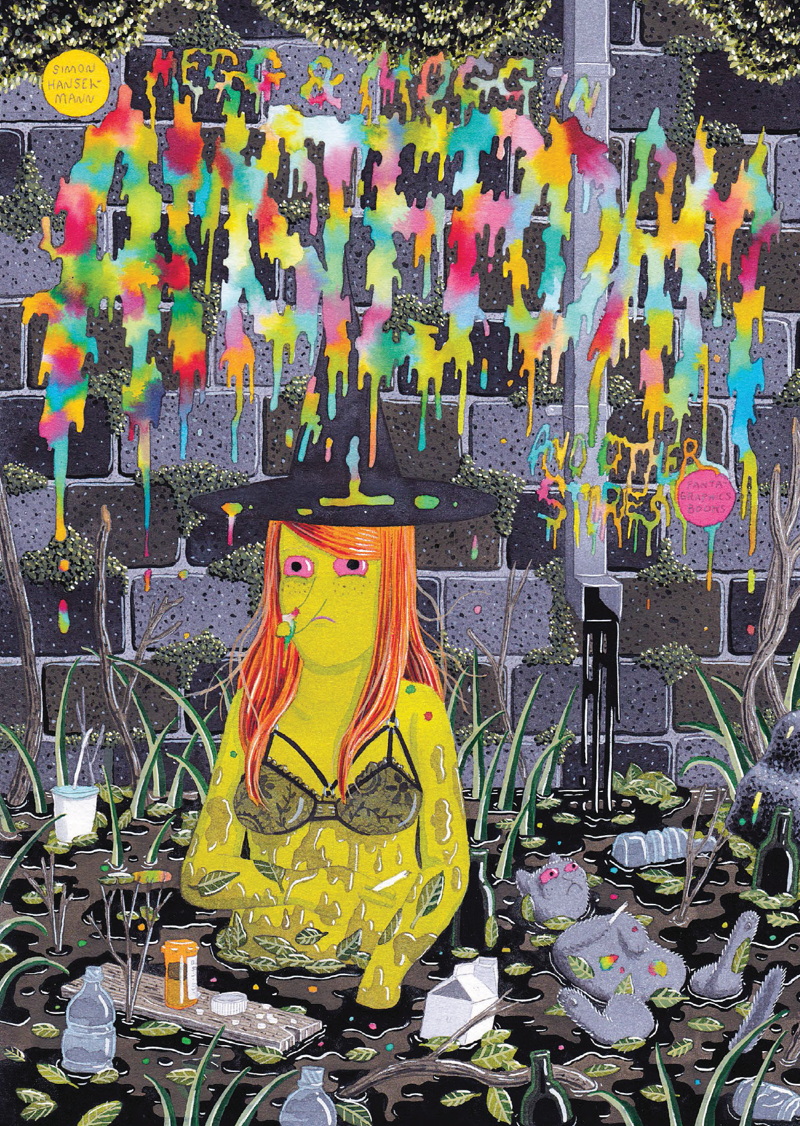
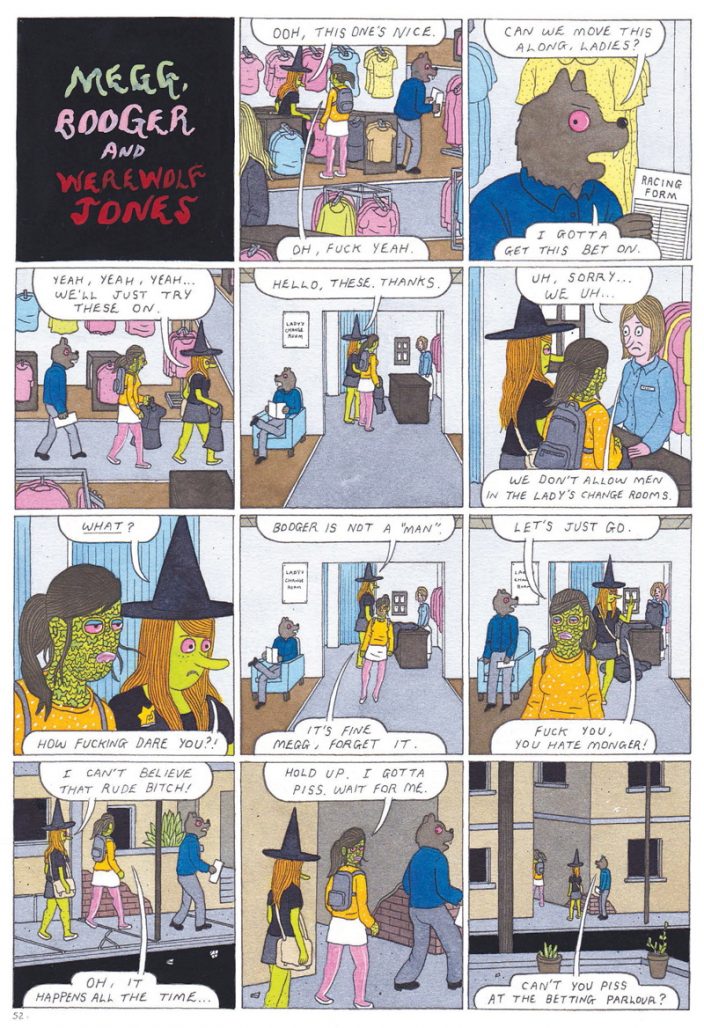
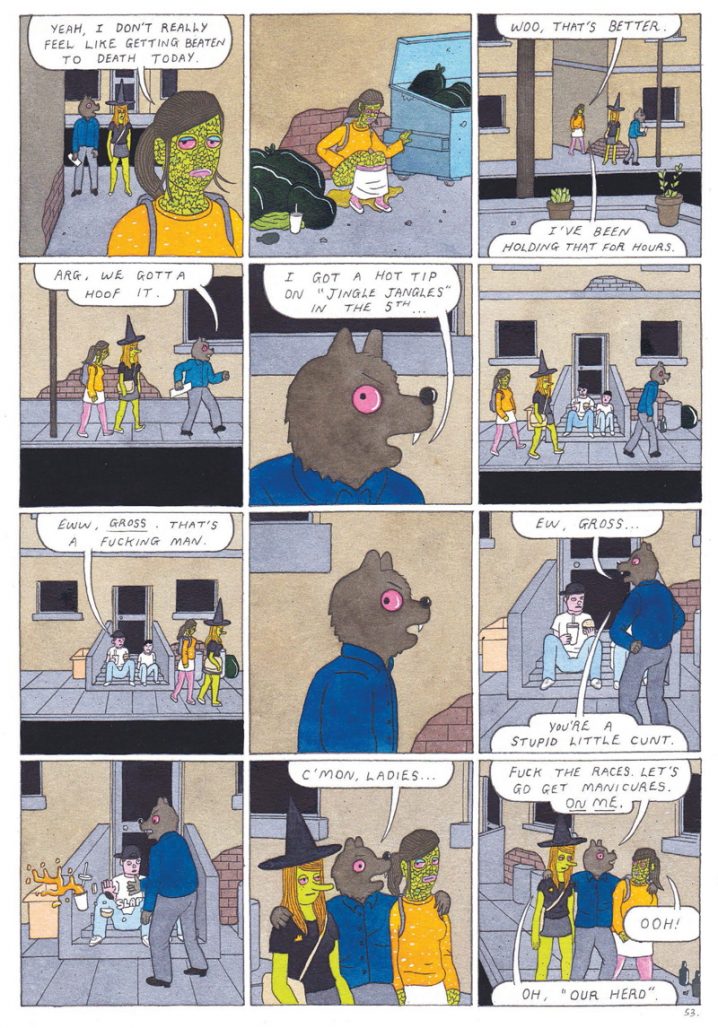
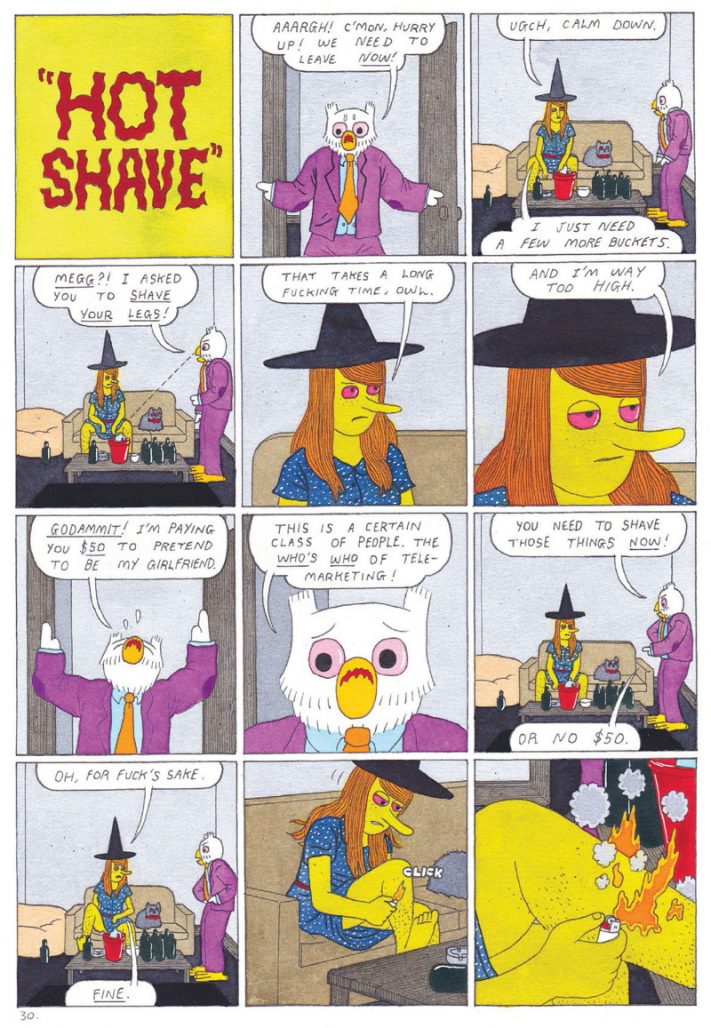
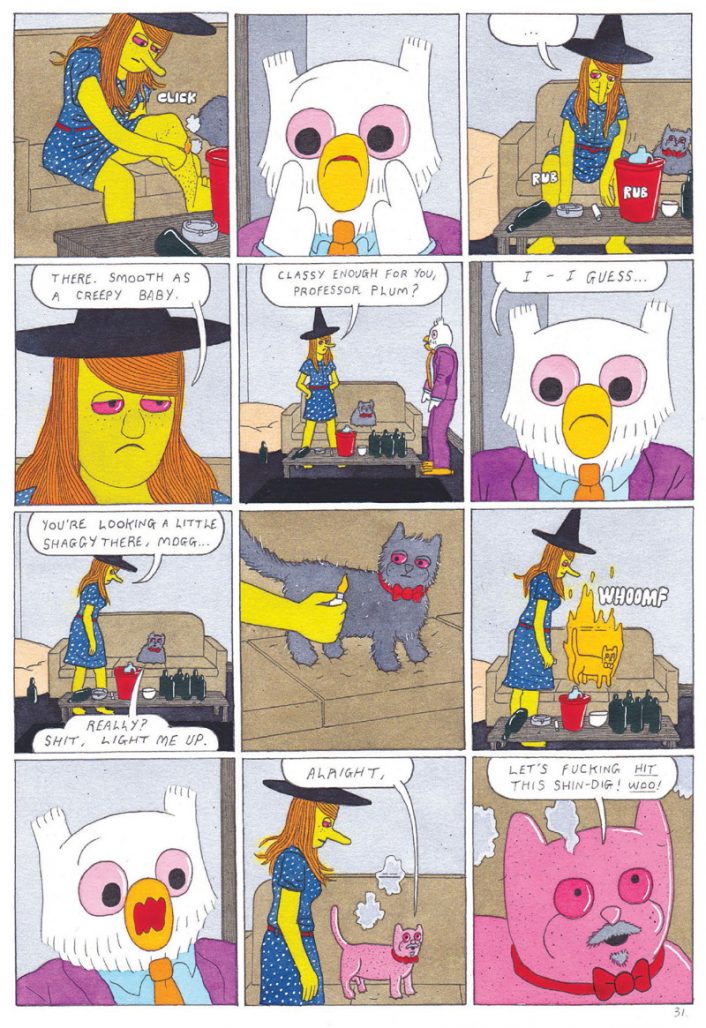

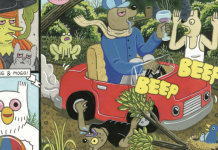
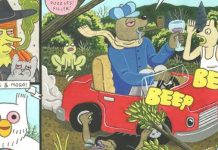



How do I find the print run on some of these titles?
Comments are closed.